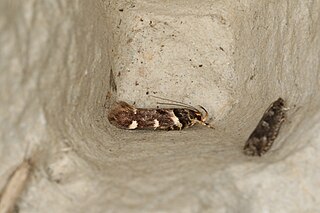
Macrobathra is a genus of moths in the family Cosmopterigidae. Most species are endemic to Australia.
Macrobathra myrocoma is a moth in the family Cosmopterigidae. It is found in India (Assam) and China.
Macrobathra petalitis is a moth in the family Cosmopterigidae. It is found in India.
Macrobathra alternatella is a moth in the family Cosmopterigidae. It was described by Francis Walker in 1864. It is found in Australia, where it has been recorded from Queensland.
Macrobathra aphristis is a moth in the family Cosmopterigidae. It was described by Edward Meyrick in 1889. It is found in Australia, where it has been recorded from Western Australia.
Macrobathra brontodes is a moth in the family Cosmopterigidae. It was described by Edward Meyrick in 1886. It is found in Australia, where it has been recorded from Queensland.

Macrobathra ceraunobola is a moth in the family Cosmopterigidae. It was described by Edward Meyrick in 1886. It is found in Australia, where it has been recorded from Tasmania.
Macrobathra chryseostola is a moth in the family Cosmopterigidae. It was described by Turner in 1932. It is found in Australia, where it has been recorded from Queensland.
Macrobathra crococosma is a moth in the family Cosmopterigidae. It was described by Edward Meyrick in 1922. It is found in Australia, where it has been recorded from Queensland.
Macrobathra dasyplaca is a moth in the family Cosmopterigidae. It was described by Oswald Bertram Lower in 1894. It is found in Australia, where it has been recorded from Tasmania.
Macrobathra eudesma is a moth in the family Cosmopterigidae. It was described by Oswald Bertram Lower in 1900. It is found in Australia.
Macrobathra euryxantha is a moth in the family Cosmopterigidae. It was described by Edward Meyrick in 1886. It is found in Australia, where it has been recorded from Queensland.
Macrobathra heterocera is a moth in the family Cosmopterigidae. It was described by Oswald Bertram Lower in 1894. It is found in Australia, where it has been recorded from Tasmania.
Macrobathra isoscelana is a moth in the family Cosmopterigidae. It was described by Oswald Bertram Lower in 1893. It is found in Australia, where it has been recorded from South Australia.
Macrobathra monostadia is a moth in the family Cosmopterigidae. It was described by Edward Meyrick in 1886. It is found in India, Sri Lanka and Australia, where it has been recorded from Queensland.
Macrobathra notozyga is a moth in the family Cosmopterigidae. It was described by Edward Meyrick in 1914. It is found in Australia, where it has been recorded from Queensland.
Macrobathra polypasta is a moth in the family Cosmopterigidae. It was described by Alfred Jefferis Turner in 1932. It is found in Australia, where it has been recorded from Queensland.
Macrobathra sarcoleuca is a moth in the family Cosmopterigidae. It was described by Edward Meyrick in 1915. It is found in Australia, where it has been recorded from Queensland.
Macrobathra stenosema is a moth in the family Cosmopterigidae. It was described by Alfred Jefferis Turner in 1932. It is found in northern Australia.
Macrobathra trithyra is a moth in the family Cosmopterigidae. It was described by Edward Meyrick in 1886. It is found in Australia, where it has been recorded from South Australia.


